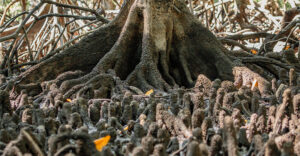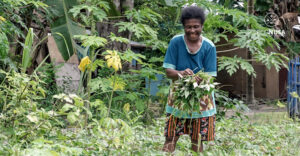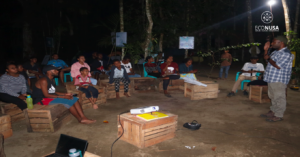
Women at Enggros Village, Abepura District, Jayapura, Papua, have long history on mangrove conservation. At this forest, women earn their livelihood from oyster, shrimp and fish. This is the assembly spot for women to share their feelings.
At around 15.30 East Indonesia Time, EcoNusa team arrived at Ciberi Beach, Jayapura. The tourism spot here is one of the gates to Enggros Village, Abepura District in Jayapura, Papua. Mama Yosmincee Hanasbey who is dubbed Mama Yos welcomed EcoNusa and three young villagers who drove the speedboat.
The afternoon breeze saluted EcoNusa. From far, there were floating dwellings with charming hills as the background. A flock of clouds danced on the blue sky. Along the trip, Mama Yos told that Ciberi Beach used to be the most beautiful beach on the area. From this spot, one could see the scenery of Youtefa Bay and Pacific Ocean. But now, the scenery is blocked by Holtekamp bridge that was just officially inaugurated by President Jokowi. Besides, the opening of new beach as tourism spot with live music along the Hamadi Beach has made Ciberi Beach loss its visitors. Only some anglers still enjoyed visiting and fishing on this beach.
After around ten minutes ride from Ciberi Beach, the speedboat stopped at the port of Enggros Village. EcoNusa dropped in on for a while on the dock to move to a smaller boat. Despite the floating residence on a bay, the village has field, church and other facilities as if village on the land. Mama Yos said that there are more than 100 families residing in this village.
What makes unique is the fact that men and women have different spots at Enggros Village to assemble and seek their daily sustenance. The men assemble at para-para (assembly point) such as village hall and earn for living from sea. Meanwhile, women gather and earn for their livelihood at the mangrove forest which is literally called women forest.
Tonotwiyat, Visiting Mangrove Tradition
While slowly rowing the boat towards the thickness of mangrove forest at the women forest, Mama Yos said that the tradition of visiting forest by women is locally called Tonotwiyat. “Tonot means forest. Wiyat means calling for women to go to forest to seek bia (oyster),” she said.

Tonotwiyat has been performed from generation to generation. Mama Yos continues the tradition of her mother and grandmother. She said that the tradition had existed long before Christianity was introduced in the village. Upon studying the evangelization era in Papua, the tradition had been existing long before 1850s.
No one knows how the tradition of visiting women forest was kicked off. But it has been for a long time when women went to the forest to seek food such as oyster, shrimp, crab and fish. But oyster is the most commodity found in the area. Mama Yos said that there are 114 types of bia found in the spot. But bia nor is deemed the most special one due to its efficacy. “Bia nor is very useful as it could cure one with diabetes. We usually cook it without many ingredients as it tastes good. We also like eating it raw here,” she said while chewing bia nor she found.
Besides, women usually assemble together to earn for their sustenance while sharing their lives. The local community believe that women forest is the assembly spot (para-para) for women who are prohibited to gather at the village hall.
“That is special assembly point for women. For men, they have their own para-para at the village. We as women do not have that kind of spot and thus, we gather together here. This is the place we share our feelings, our old days, our domestic problems with husband and children. All happens here. The elders said, even the walls at our house have ears, and so do the floors,” laughed Mama Yos.
Forests Areas Prohibited for Men
When looking for oyster and playing a joke to each other, women usually put off their clothes. It aims to ease their mobility in the mangrove mud. “Without clothes, we can move easily. If we wear our clothes, our bodies will feel itchy,” said Mama Yos.
For the reason, men understand that they are prohibited to enter the women forest. To mark their existence, the women usually talk loudly. If a man trespasses the area, he will be sanctioned. The penalty depends on the status of the women in the forest. For ordinary women, the penalty will be about one million plus beads (a sort of jewelry or precious goods). However, if a high social status woman is inside the forest, the penalty could jump up to 50 million plus beads.
Continue reading Women Forest, Mangrove Conservation by Enggros Women (Part II) here
Editor: Leo Wahyudi & Vironica Arnila Wulandani







